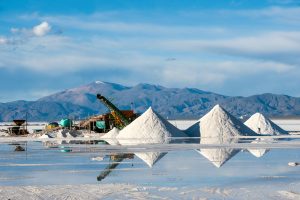It was only 10 months ago that François-Philippe Champagne, Canada’s industry minister, waved through the acquisition of Canadian miner Neo Lithium by China’s state-backed Zijin Mining Group. Brushing aside national security concerns, Champagne pointed to Neo Lithium’ assets in Argentina and assured skeptics that Neo Lithium is “really not a Canadian company.”
Chinese miners may have interpreted the deal as a welcome signal that they could continue buying up Canadian minerals unimpeded. Their relief would turn out to be short-lived.
In a dramatic twist, Ottawa announced on October 28 that foreign state-owned firms that pursue deals in Canada’s critical minerals sector would from now on “be approved on an exceptional basis.” A week later, Champagne ordered three Chinese firms to divest from three Canadian lithium miners, including two that operate in Argentina.
The surprise intervention suggests a hostile approach to Chinese investment in minerals. That has not always been the case. For years, Western countries have overlooked the national security implications of critical raw materials, ceding vast reserves of minerals to China just as the green transition was taking off.
In 2013, with financing from the China Development Bank, Tianqi Lithium outbid its U.S. rival and took over the Greenbushes mine in Australia, which has the world’s highest grade lithium deposits. The same firm then acquired a 24 percent stake in SQM, Chile’s largest lithium producer, in 2018 under the auspices of then-President Sebastián Piñera, who tried to boost private investment in the mining sector. In the Democratic Republic of Congo, a Chinese firm successively bought two of the world’s largest cobalt mines from Freeport-McMoran, a U.S. company, without raising eyebrows in the Obama or Trump administration.
Such negligence has allowed China to dominate supplies of the minerals needed for electric vehicle (EV) batteries, which are critical to energy transition and fighting climate change. The West also lacks the refining capacity, so it must first send raw materials to China to be processed. In 2022, China is expected to produce 74 percent of the world’s batteries, with shares made in Europe and the United States lagging behind at 16 and 7 percent, respectively. As China’s dominance in the global battery market became hard to ignore, mineral security finally returned to the radar of Western policymakers.
The fear of possible supply chain disruptions was confirmed by Russia’s attack on Ukraine. The war has shut down neon production in Ukraine, which supplies about half of the world’s semiconductor-grade neon. Meanwhile, Russia exports 15 percent of the world’s nickel and 21 percent of palladium – respectively used in batteries and catalytic converters. In February, concerns over possible sanctions on Russian metals sent the price of nickel to an 11-year high (the price has since fallen). Given the geopolitical rivalry between China and the West, dependence on Chinese minerals is not only commercially undesirable but also threatens the West’s strategic autonomy.
These worries have prompted governments to rethink their industrial policy, with the United States leading the way. In June, the State Department unveiled the Minerals Security Partnership, which includes Australia, Canada, South Korea, Japan, and other allies. The goal is to bolster the “friend shoring” of critical mineral supply chains – which roughly translates to reducing dependence on China and Russia for minerals, metals and energy. Congress is expanding the scope of the Defense Production Act to channel funding to “the technology and industrial bases of” Canada, Australia and the United Kingdom.
The EU, too, abandoned its free trade orthodoxy and rolled out the Critical Raw Materials Act in September. When Champagne justified the divestiture by claiming that Canada prefers “foreign direct investments from partners that share our interests and values,” he was echoing a sentiment widely shared among democracies.
Despite the lofty rhetoric, the pace of decoupling will vary with country. Take Australia, which has a history of supplying China with iron ore and lithium. According to a report by the University of Sydney and KPMG, a consultancy, the value of Chinese investment in Australia decreased by 69 percent in 2021 after the diplomatic spat over COVID-19 origins. Australia has also diversified its trade relations by selling more minerals to Japan, South Korea, and Vietnam while reducing mineral export to China. Yet Australia has fallen short of undoing existing Chinese investments. At the International Mining and Resources Conference last week, its resources minister demurred at forcing China to divest from lithium mines and said that the projects “will remain as they are.”
Nonetheless, the West has a good chance to catch up with China in the race for critical minerals. China owes its head start to a variety of state support, such as subsidies on processing plants at home and policy bank financing for buyouts abroad. By implementing a mix of industrial policies and investment screening, the United States and Europe afford their investors with the same access to credit and allow their manufacturers to quickly scale up. That is a first step in the right direction.
































